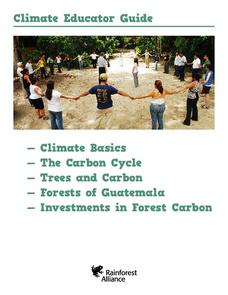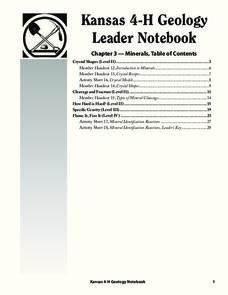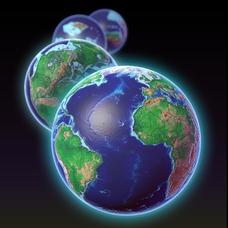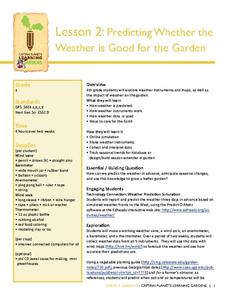Intel
Insects: The Good, The Bad, The Ugly
What would the world be like with no insects? Ponder this question using a research-based STEM unit that encourages scholars to investigate insects from both a beneficial and hazardous perspective. They learn about insect behaviors,...
Science Matters
Earthquake Waves: Wave Notes
A multi-part lesson opens with a review of p waves and s waves. Then scholars use a simple s wave simulator to view the way the wave travels. Next, pupils use cups and various fluids to simulate p waves moving through different mediums....
Chicago Botanic Garden
Historical Climate Cycles
What better way to make predictions about future weather and climate patterns than with actual climate data from the past? Young climatologists analyze data from 400,000 to 10,000 years ago to determine if climate has changed over time....
Chicago Botanic Garden
Micro-GEEBITT Climate Activity
A truly hands-on and inquiry based learning activity bridges all the lessons in the series together. Beginning with a discussion on average global temperatures, young meteorologists use real-world data to analyze climate trends in order...
PHET
The Greenhouse Effect
How do greenhouse gases impact temperature? Have your classes use the interactive software to explore different concentrations of greenhouse gases and their effect on climate. Learners can recreate different atmospheric concentrations...
NOAA
Biological Oceanographic Investigations – Call to Arms
How many simple machines does it take to make a robotic arm? An inquiry-based lesson explores that topic and challenges pupils to build a robotic arm that can stretch, turn, and more. A few questions help guide them in the right...
NOAA
Importance of Deep-Sea Ecosystems – What Killed the Seeds?
Most drugs used today come from nature, so the discovery of new ecosystems in the deep sea is exciting from a medical perspective. Scholars develop their own bioassay to test germination rates in seeds.
NOAA
Biological Oceanographic Investigations – What's in That Cake?
Have you ever tried to find hidden items in a picture when you don't know what you are looking for or how many things are hidden? A lesson applies that same concept to sampling the deep sea habitats. Participants must first create a...
Rainforest Alliance
Climate Educator Guide
Climate change is a hot topic in the news. Class members examine carbon dioxide data to analyze trends of our atmospheric makeup over time. They also discuss climate and climate change, and determine how these changes are affecting life...
K-State Research and Extensions
Field Trip Preparations
Scholars prepare for a field trip to collect rock specimens. They learn how to build proper display boxes, create road logs, and study various geology careers. This is the final chapter in a seven-chapter unit on geology and contains six...
K-State Research and Extensions
You Ol’ Fossil
Geologists are gneiss, tuff, and a little bit wacke. The fifth chapter of seven includes ten activities at four different levels. The hands-on activities cover fossils including how they are formed, vertebrates, invertebrates,...
K-State Research and Extensions
Size It Up
The three types of rock aren't classic, punk, and hard. The chapter covers everything scholars need to know about rocks. Pupils compare rocks, learn about their formation, see how rocks change, and follow every step of the rock cycle....
K-State Research and Extensions
Peanut Butter Geology
Why are there old dinosaur bones in the museum? Because they can't afford new ones! The chapter contains seven hands-on activities at four different levels covering geological eras, dinosaurs, timelines, and statigraphy.
K-State Research and Extensions
The Crusty Earth
Geology rocks — literally! A geology chapter offers eleven activities at four different levels. Scholars enjoy completing hands-on experiments before applying critical thinking skills following a share, process, generalize, apply, and...
Chemical Education Foundation
Teacher's Guide to Science Projects
Do you find the idea of having a science fair with all of your learners intimidating? Use a guide that provides everything you need to know to make project-based learning manageable. The resource includes options for four different types...
K-State Research and Extensions
Water
How are maps like fish? They both have scales. The chapter includes six different activities at three different levels. Scholars complete activities using natural resources, learn how to read a map, see how to make a compass rosette,...
K-State Research and Extensions
Crystal Shapes
Of quartz I love geology! The chapter offers five activities at three different levels. It features hands-on activities that cover crystal shapes, cleavage and fracture, hardness scale, specific gravity, and mineral identification....
Howard Hughes Medical Institute
EarthViewer
Can you imagine Washington DC and London as close neighbors occupying the same continent? Learners will be fascinated as they step back in time and discover the evolution of the earth's continents and oceans from 4.5 billion years ago to...
NOAA
A Moving Crust
Young scientists piece together the geological puzzle that is the earth in the third and final lesson of this earth science series. With the help of numerous multimedia resources and a series of engaging hands-on activities, students...
STEM for Teachers
Tsunami!
How does the depth of an ocean affect the speed of a tsunami's waves? Use Jell-o, graham crackers, and marshmallows to model the effects of an underwater earthquake and its resulting tsunami. The lesson includes hands-on activities,...
Growing Classroom
Space Travelers
Groups of three scientists from the rocky planet Zog investigate the composition of soil so that they can take the information back to their home, create soil there, and begin to grow food.
NASA
The Science of the Sun
There's more to that glowing ball of light in sky than most children realize. From the overall structure of the solar system, to the changing of the seasons, these hands-on lessons open the eyes of young scientists to the important role...
NNF
Floods Happen
Did you know that flooding is the most common natural disaster in the United States? Prepare your learners with the facts about floods and offer them the proper knowledge and tools for dealing with this type of emergency.
Captain Planet Foundation
Predicting Whether the Weather is Good for the Garden
Can your class predict the weather? Show them how they can come close with a lesson about creating weather instruments, including weather vanes, barometers, wind socks, anemometers, and thermometers. Kids research weather patterns and...

























